Archive for 'HIV/AIDS'
Dispatch from Kibera, East Africa’s Largest Slum
Posted on August 19, 2011, by aprille, under Gender Masala, HIV/AIDS, children, culture, gender, health, politics, violence.
Photo Essay by Aline Cunico
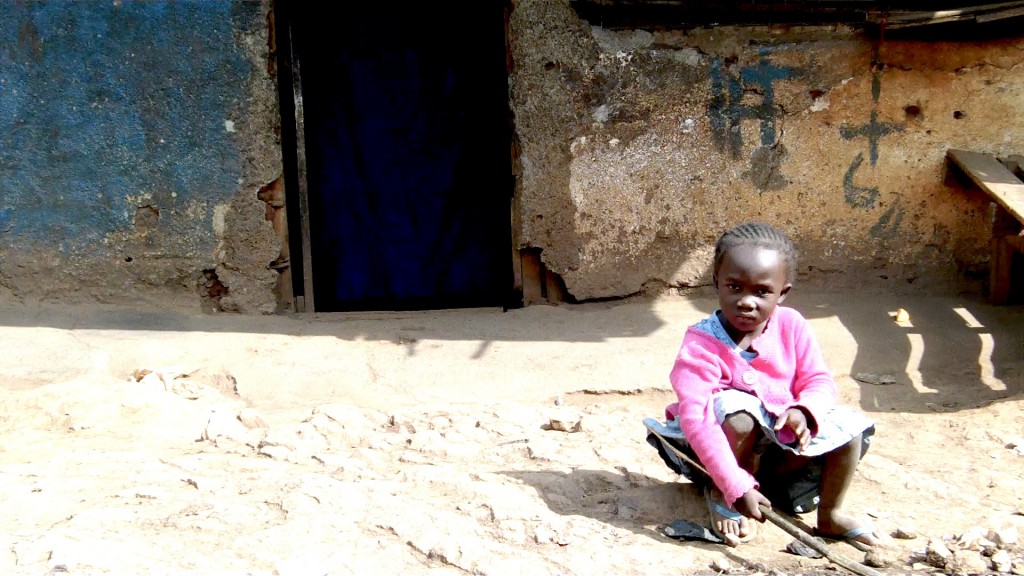 (IPS/Aline Cunico)
(IPS/Aline Cunico)
Considered one of the biggest slums in the world, Kibera is Nairobi’s–and East Africa’s–largest urban settlement. Over one million people struggle daily to meet basic needs such as access to water, nutrition and sanitation. In this community lacking education and opportunities, women and girls are most affected by poverty.
54 Comments
Fifteen years after Beijing
Posted on February 23, 2010, by Kudzai, under HIV/AIDS, harmful practices, health, human rights, media, politics, reproductive health, violence, war rape, women, men and more.
Kudzai Makombe
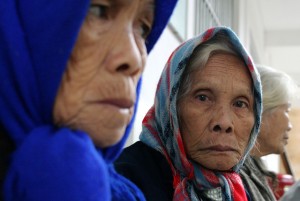
Women live longer than men but these extra years are not always healthy, says WHO. Credit: WHO/UNAIDS/K.Hesse
With the Beijing +15 review coming up next week at the Commission on the Status of Women, it seems an appropriate time to have a look at where we are globally in terms of gender equality and women’s empowerment in line with the 12 Critical Areas under the Beijing Platform for Action.
172 Comments
Fabrications around AIDS in 2010
Posted on December 26, 2009, by mercedes, under Gender Masala, HIV/AIDS, arts, culture, health, media.
By Mary Crewe and Pierre Brouard
Center for the Study of AIDS, University of Pretoria, South Africa
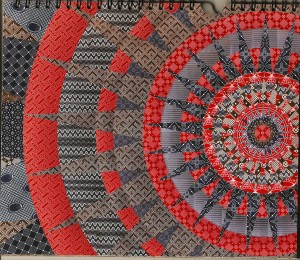 Fabrications is the theme of the 2010 calendar produced by the Center for the Study of AIDS. The gorgeous images are digitally manipulated African textiles.
Fabrications is the theme of the 2010 calendar produced by the Center for the Study of AIDS. The gorgeous images are digitally manipulated African textiles.
The notion of “fabrications” was inspired by the many stories of the AIDS quilts – designed to tell a story about someone who had died of AIDS, to honour them and to create a memorial to them that could be used as part of the fabric of people’s daily lives.
A fabrication is in this sense both a physical construction of fabrics, but also a psychological and social construction, the story of a life.
We need to tell people’s stories but we also need to acknowledge that we use stories to make sense of AIDS, to cope with it, to fashion it into something bearable, to give it meaning. (more…)
69 Comments
WORLD AIDS DAY 2009
Posted on December 1, 2009, by mercedes, under Gender Masala, HIV/AIDS, arts, children, gays and lesbians, harmful practices, health, human rights, media, politics, religion, reproductive health, stereotypes, truth commissions, violence, war rape, women, men and more.
We share the wish of Marie Mendene Owono: SEND AIDS AWAY.
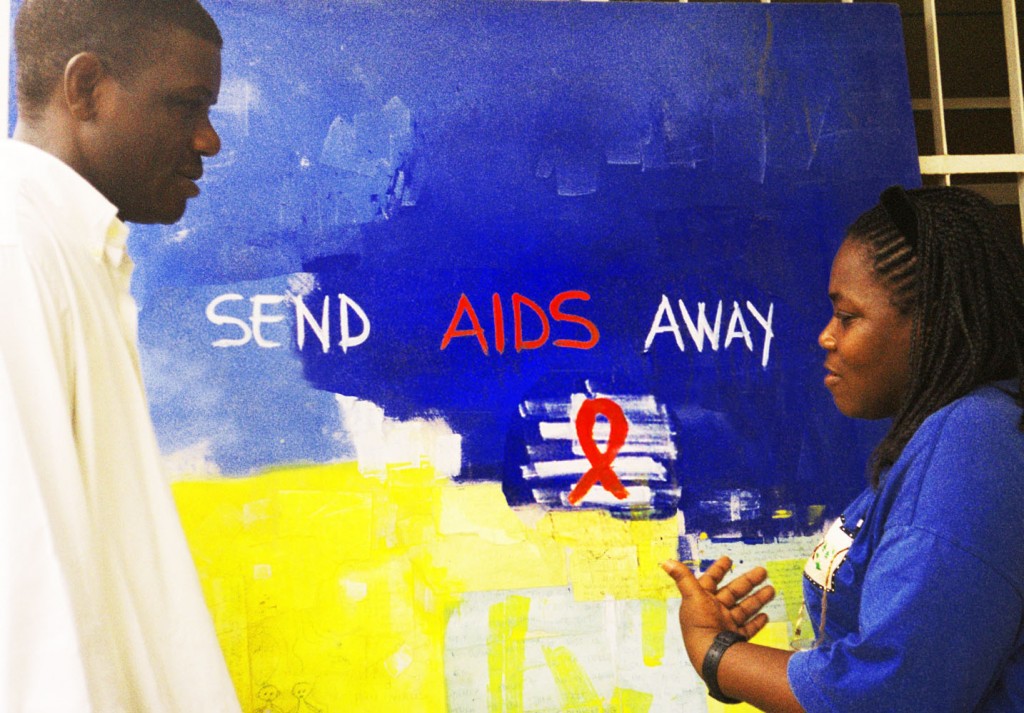
By M. Sayagues
Marie Mendene is an extraordinary activist from Cameroon and one of the first African women to say publicly that she lives with HIV, in the 1990s, when AIDS was a disease of shame and blame.
This is one of my favourite photos about AIDS in Africa. I took it at Sunshine, her NGO in Douala, in 2003, before antiretroviral treatment became widely available. Only a few Cameroonians in cities could get the life-saving pills.
The day I took the photo, Marie had queued for seven hours and received only half of her monthly ARV pills. She was understandably upset about the poor logistics and delivery of medicines. AIDS magnified all the inadequacies of health systems.
That was then. Today, nearly three million people in Africa are on ARV treatment. This seemed like a dream then, but activists were campaigning hard to make it come true.
Marie had a clear vision of activism. “We should go beyond the begging bowl and the appeal to compassion, beyond the stage of being used to do prevention and awareness, and become part of real-decision making around AIDS,” she told me.
Marie is to the right in the pic, with a fellow activist.
132 Comments
No longer invisible: caregivers speak out
Posted on September 4, 2009, by mercedes, under Gender Masala, HIV/AIDS, culture, human rights, media, violence, women, men and more.
Guest blogger: Glenda Muzenda, Care Work Manager at Gender and Media Southern Africa (GEMSA)
I just attended the Grassroots Women’s International Academy on Home Based Care in Johannesburg, South Africa.
It was a mixed bag of fun meeting women from all walks and works of life from Kenya, Cameroon, Uganda, Malawi, Nigeria, Ethiopia, Rwanda, Zambia, Ghana, Namibia, Zimbabwe, and South Africa.
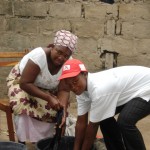
Caregiving in Mozambique. Photo: Janine Morna
The Huairou Commission and the Land Access Movement of South Africa brought us together to share experiences of home-based care.
It is fascinating how in Malawi the care givers alliance has moved forward. Victoria Kalomba, of the Malawi Group of Women Living with HIV and AIDS told us that the ministry of health and social development had spearheaded a campaign to raise awareness about people infected and affected by HIV.
The process had the ministry informing the support groups of individuals who had tested positive after visiting clinics so they could be reached and helped.
I am worried about this way of outing positive people even in the aim of mobilizing support groups. I feel that it is a human right violation to have to give information of someone’s HIV status.
109 Comments
Whose pleasure? Notes about male circumcision and female sexuality
Posted on August 24, 2009, by mercedes, under Gender Masala, HIV/AIDS, culture, health, media, women, men and more.
Guest blogger: Pierre Brouard, Deputy Director, Centre for the Study of Aids, University of Pretoria, South Africa
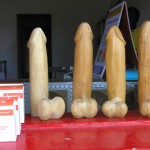
Hard task: defining sexual pleasure. Photo: M. Sayagues
So what headlines have grabbed you lately about male circumcision in South Africa? These caught my eye:
“The death toll in the Eastern Cape’s winter circumcision season has risen to 31”
“Circumcision ’scam’ probed”
“Two on run after initiate dies”
As alarming and distressing as these headlines are – and the sad, desperate and greedy subtexts embedded in them – they don’t say much about the other big debate that is raging across southern Africa: the value of male circumcision to prevent HIV acquisition in heterosexual men, and what’s in it for women. (more…)
95 Comments
Rubbing it the wrong way: condom-grabbing tourists
Posted on August 20, 2009, by mercedes, under Gender Masala, HIV/AIDS, health, media, stereotypes, women, men and more.
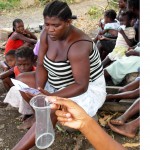
A Femidom demo. Photo: M. Sayagues/Irin
In a contest for irresponsible tourism, taking the last two female condoms at a Botswana border post as a souvenir would run neck-and-neck with littering the Central Kalahari Game Reserve with soda cans. Hey, spare a thought for a sister: a local woman might need them. I mean the condoms, not the soda cans.
Journalist Bridget Hilton-Barber writes, in the South African weekly Mail & Guardian, about the female condom’s popularity among Batswana women. (Femidoms rub the right way, 14 August). Then she plucked the last ones at the border post, as a souvenir, to lie in her office drawer.
Well, their popularity is a very good reason to leave the condoms in the box for someone who wants to use them.
Correction: Someone who needs to use them.
An average of three out of ten pregnant women at public antenatal clinics in Botswana are HIV-positive. This is an improvement over ten years ago, when four or five out of ten pregnant women were HIV-positive. Condoms helped achieve this drop. (Read about AIDS in Botswana here) (more…)
105 Comments

